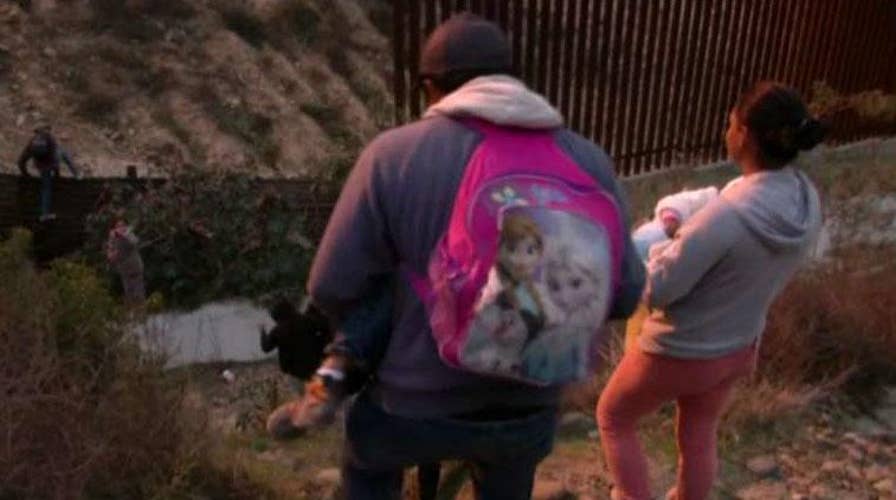Why is the US seeing a surge in migrants attempting to cross the southern border?
Thomas Homan says kids are being rented by cartels to adults because there is a lower chance of being detained.
When we have a toothache we visit a dentist. For legal matters we consult lawyers. It is therefore baffling to me that for matters of national security pertaining to America’s borders, the dialogue is not being shaped by the experts at the U.S. Border Patrol, but rather by politicians who have turned U.S. homeland security into a partisan issue.
As the director of Homeland Security Programs for the Jewish Institute for National Security of America (JINSA), I recently led a delegation to McAllen, Texas to visit the Rio Grande Valley Sector and our border with Mexico. Our purpose was to learn what challenges the Border Patrol faces and what resources it needs.
First and foremost, it must be said that the good, hardworking folks of the U.S. Customs and Border Protection (CBP) are doing an incredible job under the circumstances. They are faced with the daunting task of preventing drugs, crime and illegal immigrants from entering our country over more than 2,000 miles of border every day.
Efficiency in preventing this infiltration is dependent on CBP resources. An average of 1,000 migrants are caught daily crossing the border illegally in the Rio Grande Valley Sector. In many areas of the Rio Grande Valley there is no physical barrier. The only border between the U.S. and Mexico is the river itself, which can be narrow and shallow in some parts.
Women and children who can’t swim are floated on makeshift rafts or air mattresses across the Rio Grande. Once they land on U.S. soil, they turn themselves in to the CBP in order to receive respite from their journey, medical treatment and seek asylum.
This humanitarian effort diverts CBP agents from their patrol posts, creating vulnerabilities in our line of defense. It also diverts funds from the Border Patrol operating budget meant for security and personnel.
The challenges are substantial and so naturally the question that follows is: What can we do to increase efficacy of the CBP and protect our sovereignty? The answer should come from the Border Patrol itself.
Every CBP official who briefed our group told us about the need for a physical barrier on the border. They did not suggest that a physical barrier alone would solve all immigration problems.
In fact, the CBP advocated for a holistic approach to border security. Throughout our visit we heard a resounding call for increased personnel, technology and infrastructure to strengthen and maintain CBP’s layered and integrated border security system.
The infrastructure component – including physical barriers such as concrete walls, solid metal fencing, metal mesh fences and steel bollards – is dependent on topography and need. Not one of the CBP officials we spoke with suggested a “wall from sea to shining sea,” but all viewed physical barriers as an effective element in advancing their security mission.
In conjunction with a physical barrier, the CBP has called for more technological improvements including an increased number of permanent towers fitted with cameras, microwave transmitters and radios that enable Border Patrol agents to monitor multiple portions of the border.
The CPB is also seeking: additional tethered aerostat radar systems, which are blimp-like dirigible aircraft; more seismic and motion sensors; and remote video and mobile surveillance systems.
While such “virtual fences” allow law enforcement to track and monitor unlawful penetration of our borders, they provide little to no security without the accompanying infrastructure and personnel.
However, maybe the greatest lesson from this visit was that personnel, technology and infrastructure are only stopgap measures. Our entire immigration system is broken, from top to bottom and has been for decades. No one political party or branch of government is solely to blame.
This is a problem that has a solution and can be resolved with reason and compromise. Politicians need to stop using migrants as pawns and take steps to end the misery caused by our current system.
This includes setting immigration quotas and criteria and resolving the status of those already here. It also includes adequately staffing and greatly improving the efficiency of the federal agencies responsible for the administration of our immigration system.
CLICK HERE TO GET THE FOX NEWS APP
Until such time as Congress decides to get serious about reforming our immigration system, we are still a nation of laws and those laws must be respected. The CBP deserves our support and the resources it needs for its mission of keeping America safe and protecting our borders.
If this support consists of personnel, technology and infrastructure and if infrastructure includes a physical barrier, we must listen,and we must give them what they need.









































